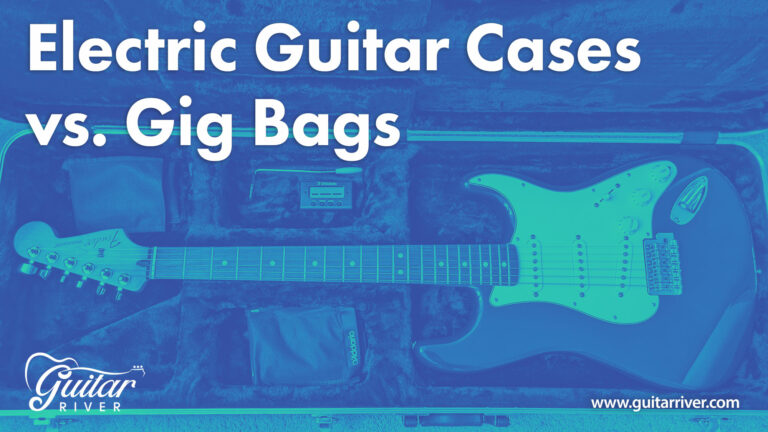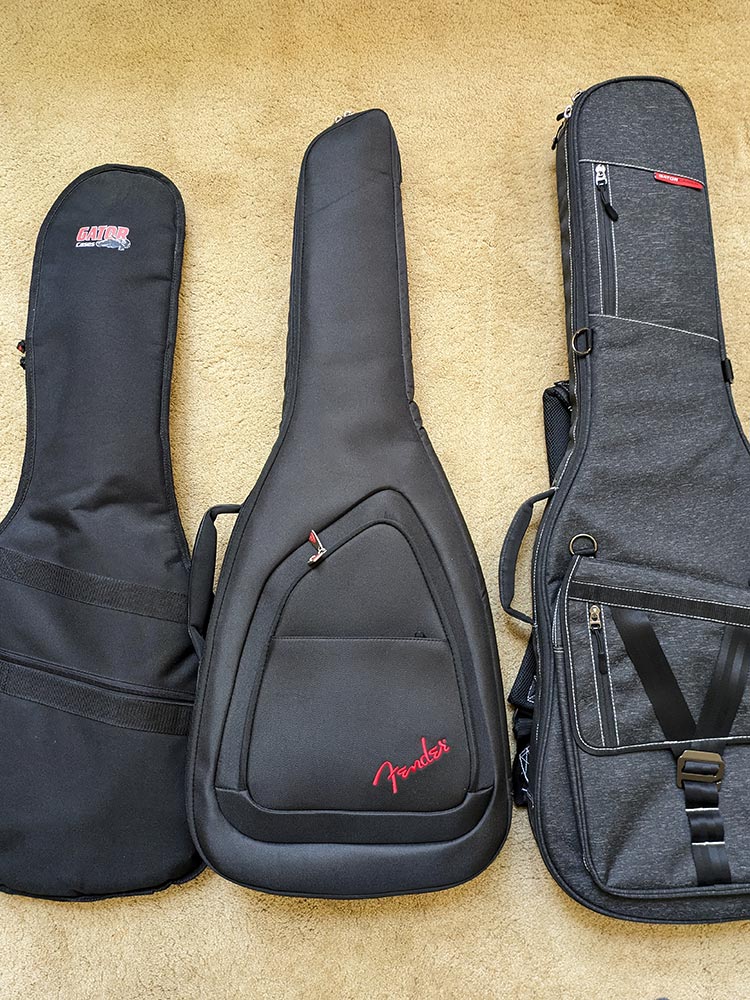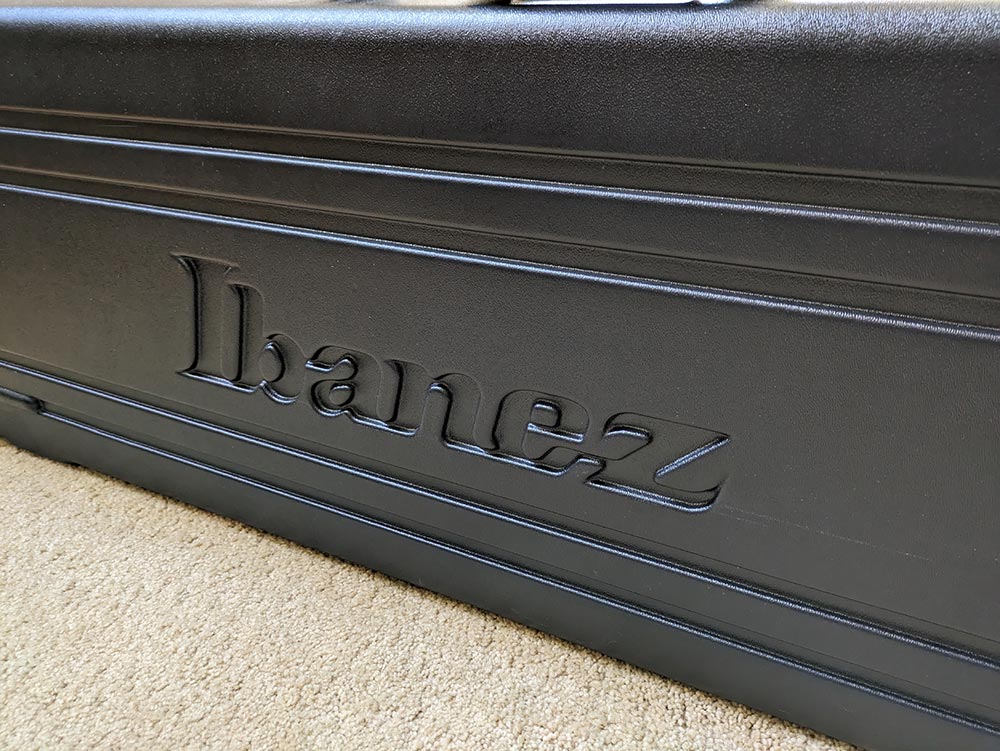Guitar River is reader-supported. We may earn a commission when you make a purchase using the links on our site.
Learn more.
Protect Your Guitar with the Right Case: Hardshell Cases vs. Gig Bags

Investing in a good guitar case is essential for any musician, but with many options available, how do you know which one to choose?
Hardshell cases offer the most durable protection and are more cost-effective in the long run, while gig bags are lightweight and easier on the wallet but don’t provide the same level of protection. Gig bags suit local gigs, while hardshell cases are great for long-term guitar storage and travel.
Keep reading to learn the differences between hardshell cases and gig bags and decide which is best for your needs.
What are Gig Bags and Hardshell Cases?
When protecting your guitar, there are two main options: guitar cases and gig bags. Both offer different levels of protection, so it’s essential to understand their differences before purchasing. We’ll look at the advantages and disadvantages of each, as well as their cost, weight, portability, storage capacity, and more.
Hardshell Guitar Cases
Hardshell cases are made of a tough outer shell combined with a layer of padding that offers excellent protection against impact damage. A sealed guitar case also provides additional insulation from temperature changes, humidity, and dust.
Most hardshell cases are made from wood or plastic, with internal foam padding and a layer of soft material to protect the guitar. The exterior of some hard cases is constructed with fiberglass, though wood or ABS plastic is more common.
Hardshell electric guitar cases are heavier than gig bags but offer the best protection for your instrument.
Gig Bags
Gig bags are lightweight, padded bags that provide some degree of protection against scratches and minor impacts. They are made from nylon or other synthetic fabrics and feature pockets for storing picks, strings, and other accessories.
Gig bags can be more affordable than hardshell cases and much easier to transport, but they don’t offer the same level of protection as a hardshell case.
Some gig bags, such as the Mono Vertigo, aim to offer the best of both worlds by providing an internal support system for your guitar. These bags are more substantial than the typical dust cover gig bag and are priced similarly to a hardshell case.

Pros and Cons of Guitar Cases & Gig Bags
When deciding between a guitar case or a gig bag, it’s worthwhile to consider how you will use it and the advantages and disadvantages of each option.
Hardshell Case Pros
- Hardshell electric guitar gases provide durable protection from impact, temperature changes, humidity, and dust.
- Hard cases–especially models designed for travel–have sturdy latches and locks that provide extra security against theft.
- Many electric guitar cases have larger storage compartments than gig bags, with room for guitar pedals and other larger items.
- Guitar cases may be more cost-effective in the long run, especially for frequent use or travel.
Hardshell Case Cons
- While more substantial and protective, hardshell cases can be heavy and bulky compared to gig bags.
- Guitar cases are usually more expensive than gig bags, except for more advanced and specialty soft cases like the Mono Vertigo.
Gig Bag Pros
- Electric guitar gig bags are lightweight and easy to transport when compared with their hardshell guitar case counterparts.
- Comfortable backpack straps and padding allow you to wear the bag as a backpack while traveling.
- Gig bags usually have multiple pockets and compartments with plenty of storage space for accessories such as picks, strings, and tuners.
- For the most part, soft cases are less expensive than the typical hardshell guitar case.
Gig Bag Cons
- As gig bags are more lightweight, they offer limited protection against impact damage and weather conditions, such as temperature changes and humidity.
- With their soft outer shell, gig bags are more susceptible to wear and tear over time.
Which one should you choose? Ultimately, it depends on your needs. A gig bag might be the best choice if you’re looking for an economical, easy transport option.
However, if you want to ensure maximum protection for your instrument and can afford it, a hardshell case is probably the way to go.
Can you humidify a gig bag? Check out our article on the topic to find out.
Electric Guitar Gig Bag and Case Portability & Storage Capacity
Aside from the cost, portability & storage capacity are two primary factors when considering a guitar case or gig bag. Here’s what you need to know.
Portability
With their lighter weight, more compact size, comfortable backpack straps, and padding – many find that gig bags are easier to handle. Gig bags are well-suited to carry a guitar around town for practice or local gigs.
Storage Capacity
Owing to their larger size and rectangular shape, most hardshell guitar cases have more internal storage space than gig bags. The spacious storage compartments will hold guitar pedals and other sizable items.
That said, all but the most basic gig bags have zippered storage compartments for accessories such as cables, picks, and strings. Separate storage areas can be an advantage so that items don’t shift around during transit as they might in a guitar case.
Electric Guitar Case and Gig Bag Cost & Weight
As discussed earlier, gig bags have a weight advantage and are generally less expensive than guitar cases. But there are some high-end lightweight guitar cases and high-end gig bags that break this rule of thumb.
Electric Guitar Case Cost
For the most part, guitar cases are more expensive than gig bags due to their construction (e.g., wood and ABS plastic instead of a nylon outer shell).
However, there is a wide range in price depending on the type and brand you choose – some high-end models can cost hundreds of dollars.
On average, expect to pay anywhere from $100-$200 for a decent hardshell case or $60-$120 for a good quality gig bag.
Electric Guitar Case Weight
As mentioned above, guitar cases are heavier than gig bags due to their construction materials (e.g., wood vs fabric). Most hardshell cases weigh 8-15 lbs (3-7 kg), while most electric guitar gig bags weigh 2-5 lbs (1-2 kg).
Check out our guitar case and gig bag buyer’s guide with our top picks for the best electric guitar gig bags and hardshell cases.

Frequently Asked Questions
It is essential to keep your electric guitar in a case when not in use. This will help protect your instrument from dust, changes in humidity, and accidental damage.
Whether you’re a frequent traveler or want to keep your guitar safe, an electric guitar gig bag or case is a must-have accessory. Don’t take chances–invest in a reliable case today.
There’s no better choice to protect your electric guitar than a sturdy hardshell case. Not only does it offer great protection, but it is best for travel and long-term storage.
With a hardshell case, you can enjoy peace of mind knowing your prized possession is safe and secure.
However, a high-quality electric guitar gig bag can serve you well for local travel. Some sturdy gig bags offer almost as much protection as a guitar case.
We still prefer hardshell cases for the best protection from dings and dents and more consistent humidity levels.
For local gigs, absolutely! It’s called a gig bag for a reason.
However, if you are flying with your guitar, we recommend a guitar case built for travel with TSA-approved locks.
If traveling by van or bus, you might also want to invest in a hard case. It will offer the best protection for your instrument.
The best way to find a case for your needs is to start with the style of case you need and your specific guitar model. Understand the price you want to pay, and then compare the different products on the market.
You can shop in person or online to help you decide on your desired features. Compare different brands such as Fender, SKB, and Gator. Gator cases are some of our favorites and are recommended for most people.
See what brands are in stock, and look for any featured sales. Shop around, and you just might find a deal.
Most guitar cases are close to the same size, but they will vary between models and manufacturers. Cases for different guitar body types will be a different size than a standard S-type guitar case.
For long-term storage, it’s best to use a hardshell case. An electric guitar gig bag can be great for local travel and temporary storage.
A high-quality electric guitar gig bag can provide almost as much protection as a hardshell guitar case.
With their internal padding and spacious storage compartments, these soft cases are perfect for transporting your musical gear.
A gig bag is a soft, padded bag that holds a musical instrument such as an electric or acoustic guitar.
An affordable gig bag starts at around $30, while the price of high-end options can exceed $200.
Most electric guitars do not come with a case. But some more expensive guitars come with a case or gig bag branded by the manufacturer.
In addition, you will find some beginner bundles that include a soft case. They might even include a practice amp, cable, and guitar picks.
Guitar cases are worth it for long-term storage, travel, and all-around protection for your instrument. If you plan to keep your guitar for a long time or resell it down the road, a guitar case will help keep it in good condition and retain its value.
In short, no. There are some more universal guitar cases, including Gator cases, but some cases are designed to fit specific guitars.
For example, if you have an LP-style guitar, look for a case designed to fit LP-style guitars. Some more unusually-shaped guitars, such as the Explorer or Flying V, have specific cases designed for their shape.
The safest way to store your electric guitar is in a sturdy hard case. This will help protect it from accidental dents and dings and keep the dust out of the electronics.
Relative to the cost of your instrument, guitar cases and high-quality electric guitar gig bags are not too expensive and should last almost as long as your guitar depending on your usage.
That said, you should factor in the cost of a case when planning a guitar purchase. If you buy an inexpensive guitar, you may decide the extra cost of a case is not worth it.
Wrapping Up
Choosing between a hardshell case or a gig bag depends on your preference and budget.
If you want maximum protection for your guitar and don’t mind the added weight and cost, a hardshell case is the way to go.
But if you’re looking for something lightweight and more affordable, a gig bag might be just what you need.
Whichever option you choose, ensure it offers enough protection for your instrument. Happy playing!



